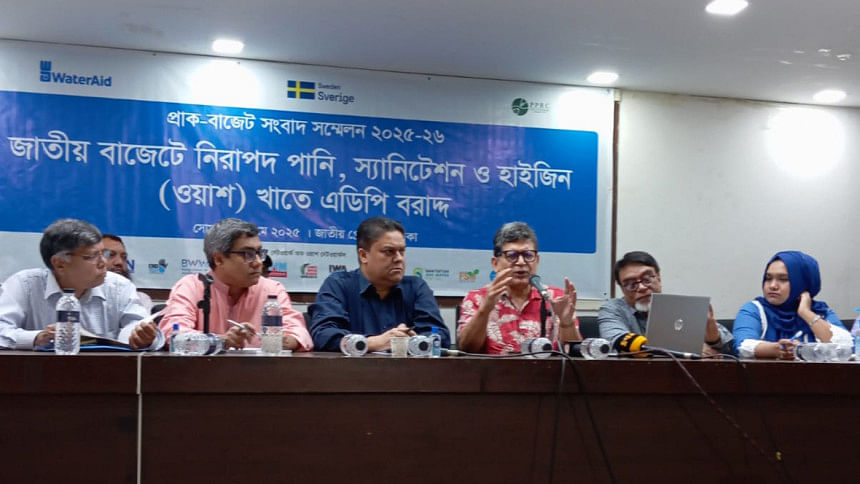Equitable WASH Access: Upholding citizens’ rights and eliminating disparities

It is widely accepted that citizens of a country have the inherent right to access water, sanitation, and hygiene (WASH) services that ensure their health, promote social development, and mitigate environmental degradation through climate-adaptive livelihoods and innovative WASH solutions. Bangladesh has adopted several policies and a strategic plan, including the Sector Development Plan (SDP) 2011-25 and the National Strategy for Water Supply and Sanitation 2021.
At a press conference held at the National Press Club on Monday, May 19, 2025, these points were mentioned.
Several civil society organisations and networks, including WaterAid, PPRC, MHM Platform, FANSA, FSM Network, and Sanitation and Water for All, with other members of the Network of WASH Networks, jointly organised this press conference.
At the press conference, a Prominent economist and PPRC Executive Chairperson, Dr. Hossain Zillur Rahman, highlighted the urgent issue of declining WASH allocations.
He stated that the once upward trend in WASH allocations observed since FY 2016-17 reversed in FY 2023-24 and further decreased by 22.46% in FY 2024-25. This negative trajectory threatens SDG 6 and national targets (NPTs 17-18). In FY 2023-24, a decline of 23% in WASH allocation was observed, with Taka 139.72 billion from Taka 182.28 billion in FY 2022-23. However, this decline was slightly reversed by an increase of 7.22% (Taka 149.81 billion) in the revised FY 2023-24 budget.
The allocation further decreased in FY2024- 25 (22.46%) and poses a serious threat to ensuring citizens' rights to safe water and safely managed sanitation. Figure 1 below shows the downward trend in ADP WASH allocation from FY 2023-24. The gap between urban and rural WASH investments remains stark, raising concerns about equity. The ADP budget in WASH allocations continues to widen the gap between urban and rural areas, Dr. Rahman added.
Fayazuddin Ahmad Advocate, Policy and Advocacy Lead at WaterAid, shared that budgetary trends indicate erratic allocations for hilly, coastal, and haor regions. A rise in coastal allocations in FY2023- 24 resulted from new projects, but overall equity among these areas remains unaddressed. Such a trend doesn't align with the government's declaration to ensure safe water and sanitation (NPTs 17 & 18) for all its citizens.
Sumaiya Binte Anwar from Climate Justice Alliances informed that while 25 ministries implement WASH-related projects through the Climate Change Trust Fund (CCTF) and ADP projects, only 13 ministries prioritize WASH investments. However, it is commendable that the climate WASH budget has risen significantly. She said that a few ministries have undertaken projects to protect the environment, biodiversity, and other related adaptation programs from the adverse impacts of climate change.
Mohammad Zobair Hasan from the International Water Alliance shared that, since FY2019- 20, government departments have faced implementation delays due to limited capacity, often leading to partial budget withdrawals in revised allocations. Full utilization of the budget was not achieved during the last eight financial years.
Mohammad Abdul Wazed shared the following recommendations on behalf of the Network of WASH Networks:
- Ensure discrimination-free WASH allocations in urban-rural areas, secondary towns, and hard-to-reach regions. The allocation of ADP to WASH sub-sectors (sanitation and hygiene) and related projects (FSM, solid waste management, and CCA Projects) should be proportionate and equitable.
- Another crucial recommendation from Mohammad Abdul Wazed is to promote inclusive WASH investments. This is to ensure that women's rights and marginalized and excluded groups, such as tea garden workers, bede, dalit, horizon, Jolodas/fishermen, receive fair allocations. This emphasis on inclusivity is vital to ensure equitable access to WASH services.
- Encourage all relevant ministries (25 total) to implement WASH-focused projects under climate financing. Scale up successful initiatives, such as rainwater harvesting and Rainwater Outfall Systems (ROS). RCCE should be appropriately applied, including capacity building for the community people.
- Expand and maintain WASH blocks in schools, including the installation of deep tubewells and water tanks for rainwater harvesting, and ensure that recurrent budget funds are allocated for long-term sustainability.
- Strengthen hygiene advocacy across ministries, including non-health sectors and civil society organizations. Non-governmental actors should be active in promoting hygiene practices.
- One of the key recommendations is to improve project implementation capacity to ensure timely utilization and prevent budget downsizing. This will not only ensure the effective use of allocated funds but also instill confidence in the public and stakeholders about the successful execution of WASH projects.
- Another crucial recommendation is to align WASH budget growth with ADP expansion to avoid unpredictable fluctuations. This will provide a sense of stability and security about the future of WASH funding, ensuring continuous support for WASH projects.

 For all latest news, follow The Daily Star's Google News channel.
For all latest news, follow The Daily Star's Google News channel. 



Comments